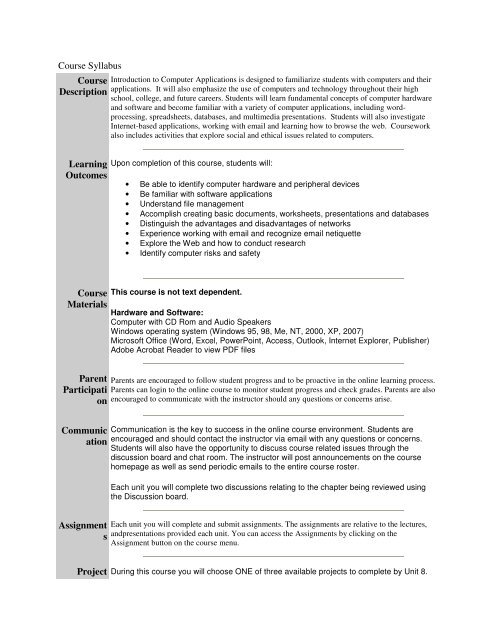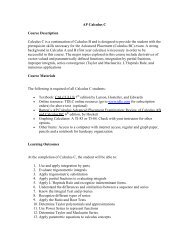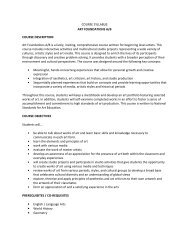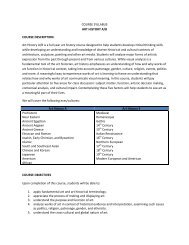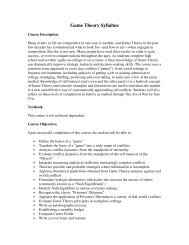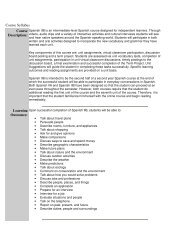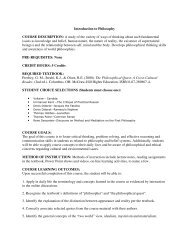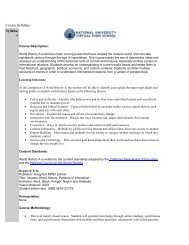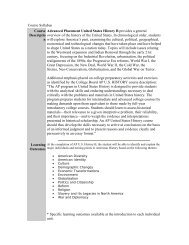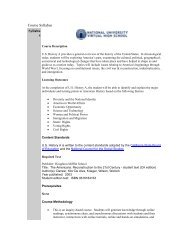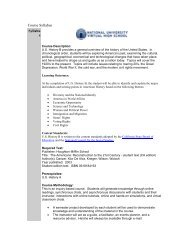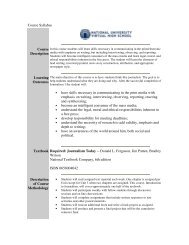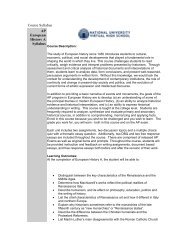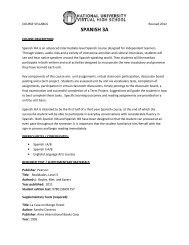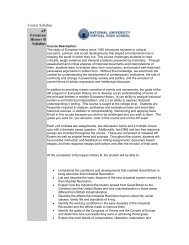Introduction to Computers Syllabus
Introduction to Computers Syllabus
Introduction to Computers Syllabus
You also want an ePaper? Increase the reach of your titles
YUMPU automatically turns print PDFs into web optimized ePapers that Google loves.
Course <strong>Syllabus</strong><br />
Course<br />
Description<br />
<strong>Introduction</strong> <strong>to</strong> Computer Applications is designed <strong>to</strong> familiarize students with computers and their<br />
applications. It will also emphasize the use of computers and technology throughout their high<br />
school, college, and future careers. Students will learn fundamental concepts of computer hardware<br />
and software and become familiar with a variety of computer applications, including wordprocessing,<br />
spreadsheets, databases, and multimedia presentations. Students will also investigate<br />
Internet-based applications, working with email and learning how <strong>to</strong> browse the web. Coursework<br />
also includes activities that explore social and ethical issues related <strong>to</strong> computers.<br />
Learning<br />
Outcomes<br />
Upon completion of this course, students will:<br />
• Be able <strong>to</strong> identify computer hardware and peripheral devices<br />
• Be familiar with software applications<br />
• Understand file management<br />
• Accomplish creating basic documents, worksheets, presentations and databases<br />
• Distinguish the advantages and disadvantages of networks<br />
• Experience working with email and recognize email netiquette<br />
• Explore the Web and how <strong>to</strong> conduct research<br />
• Identify computer risks and safety<br />
Course<br />
Materials<br />
This course is not text dependent.<br />
Hardware and Software:<br />
Computer with CD Rom and Audio Speakers<br />
Windows operating system (Windows 95, 98, Me, NT, 2000, XP, 2007)<br />
Microsoft Office (Word, Excel, PowerPoint, Access, Outlook, Internet Explorer, Publisher)<br />
Adobe Acrobat Reader <strong>to</strong> view PDF files<br />
Parent<br />
Participati<br />
on<br />
Parents are encouraged <strong>to</strong> follow student progress and <strong>to</strong> be proactive in the online learning process.<br />
Parents can login <strong>to</strong> the online course <strong>to</strong> moni<strong>to</strong>r student progress and check grades. Parents are also<br />
encouraged <strong>to</strong> communicate with the instruc<strong>to</strong>r should any questions or concerns arise.<br />
Communic<br />
ation<br />
Communication is the key <strong>to</strong> success in the online course environment. Students are<br />
encouraged and should contact the instruc<strong>to</strong>r via email with any questions or concerns.<br />
Students will also have the opportunity <strong>to</strong> discuss course related issues through the<br />
discussion board and chat room. The instruc<strong>to</strong>r will post announcements on the course<br />
homepage as well as send periodic emails <strong>to</strong> the entire course roster.<br />
Each unit you will complete two discussions relating <strong>to</strong> the chapter being reviewed using<br />
the Discussion board.<br />
Assignment Each unit you will complete and submit assignments. The assignments are relative <strong>to</strong> the lectures,<br />
s<br />
andpresentations provided each unit. You can access the Assignments by clicking on the<br />
Assignment but<strong>to</strong>n on the course menu.<br />
Project During this course you will choose ONE of three available projects <strong>to</strong> complete by Unit 8.
The project options include:<br />
• <strong>Computers</strong> and Society<br />
• All About Bill<br />
• Computer Ethics<br />
You will utilize the first four units of the class <strong>to</strong> research and develop a project proposal.<br />
You will submit your project proposal <strong>to</strong> your instruc<strong>to</strong>r for critique and review. During the<br />
last four units of the class you will spend your time developing, formatting and finalizing<br />
your project using the Microsoft program of your choice. Your final project submission will<br />
incude a Microsoft document, spreadsheet or presentation.<br />
You will learn more about your project options and find directions through the course.<br />
Course<br />
Outline<br />
Course Home<br />
Review:<br />
• <strong>Syllabus</strong><br />
• Calendar<br />
• How <strong>to</strong> Post Assignments<br />
• Academic Honesty<br />
• What is Plagiarism?<br />
• Writing Standards<br />
• How <strong>to</strong> Write a Bibliography<br />
• Cornell Note Taking Instructions<br />
• Cornell Notes Example<br />
Activities:<br />
• Student Lounge<br />
• Questions<br />
• Questionnaire<br />
Unit 1: Computer Basics<br />
Review:<br />
• Learning Outcomes<br />
Lectures:<br />
• Computer Basics<br />
• Office Basics<br />
• If You Have an Older Version...<br />
• Working with Files<br />
Activities:
• Unit Pre-Test<br />
• Vocabulary<br />
• Discussion Board<br />
• Assignment<br />
• Questions <strong>to</strong> Ponder<br />
• Quiz<br />
• Project<br />
Review:<br />
• Learning Outcomes<br />
Lectures:<br />
Unit 2: Working with Word<br />
• Creating a Document (Working with Word)<br />
• Text<br />
• Shortcuts<br />
• Proofing Tools<br />
• Creating Tables<br />
• Creating Charts<br />
• SmartArt Diagrams<br />
• Drawing and Manipulating Lines, Shapes, and Other Ob<br />
• Finalizing Your Document<br />
• Word Quick Reference<br />
Activities:<br />
• Unit Pre-Test<br />
• Vocabulary<br />
• Assignment<br />
• Discussion Board<br />
• Quiz<br />
• Project<br />
Review:<br />
• Learning Outcomes<br />
Unit 3: Working with Publisher<br />
Lectures:<br />
• Introducing Publisher<br />
• Refine Your Publication<br />
• Finalizing Your Publication
Activities:<br />
• Unit Pre-Test<br />
• Vocabulary<br />
• Discussion Board<br />
• Assignment<br />
• Questions <strong>to</strong> Ponder<br />
• Quiz<br />
• Project<br />
Review:<br />
• Learning Outcomes<br />
Lectures:<br />
Unit 4: Excel<br />
• Creating a Worksheet (Using Excel)<br />
• Formatting Your Worksheet<br />
• Finalizing Your Worksheet<br />
Activities:<br />
• Unit Pre-test<br />
• Vocabulary<br />
• Discussion Board<br />
• Assignment<br />
• Questions <strong>to</strong> Ponder<br />
• Quiz<br />
• Midterm<br />
Review:<br />
• Learning Outcomes<br />
Lectures:<br />
Unit 5: PowerPoint<br />
• Creating a Presentation (Working with PowerPoint)<br />
• Finalizing Your Presentation<br />
• PowerPoint Quick Reference<br />
Activities:<br />
• Unit Pre-test<br />
• Vocabulary<br />
• Discussion Board
• Assignment<br />
• Questions <strong>to</strong> Ponder<br />
• Quiz<br />
• Project<br />
Review:<br />
• Learning Outcomes<br />
Lectures:<br />
• Creating a Database (Using Access)<br />
• Finalizing Your Database<br />
Unit 6: Access<br />
Activities:<br />
• Unit Pre-Test<br />
• Vocabulary<br />
• Discussion Board<br />
• Assignment<br />
• Questions <strong>to</strong> Ponder<br />
• Quiz<br />
• Project<br />
Review:<br />
• Learning Outcomes<br />
Lectures:<br />
Unit 7: eMail<br />
• What is a Network?<br />
• Working with eMail<br />
Activities:<br />
• Unit Pre-Test<br />
• Vocabulary<br />
• Discussion Board<br />
• Assignment<br />
• Quiz<br />
• Project<br />
Unit 8: The Web<br />
Review:
• Learning Outcomes<br />
Lectures:<br />
• Browsing the Web<br />
• Computer Risks and Benefits<br />
Activities:<br />
• Unit Pre-Test<br />
• Vocabulary<br />
• Discussion Board<br />
• Assignment<br />
• Questions <strong>to</strong> Ponder<br />
• Quiz<br />
• Project<br />
• Final Exam<br />
NUVHS<br />
Expected<br />
Schoolwide<br />
Learning<br />
Results<br />
(ESLRs)<br />
NUVHS Expected Schoolwide Learning Results (ESLRs):<br />
It is anticipated that NUVHS students will be:<br />
Engaged Learners<br />
1. Demonstrate self-directed learning skills such as time management, and personal<br />
responsibility through the completion of course requirements<br />
2. Develop an understanding of their own preferred learning styles <strong>to</strong> enhance their overall<br />
academic potential<br />
3. Incorporate effective and relevant internet and multimedia resources in their learning process<br />
<strong>to</strong> broaden their knowledge base<br />
Critical Thinkers<br />
1. Effectively analyze and articulate sound opinions on a variety of complex concepts<br />
2. Illustrate a variety of problem-solving strategies that strengthen college preparation and<br />
workforce readiness<br />
3. Formulate a framework for applying a variety of technology and internet-based research <strong>to</strong><br />
enhance information literacy and collaborative thinking<br />
Effective Communica<strong>to</strong>rs<br />
1. Demonstrate awareness and sensitivity <strong>to</strong> <strong>to</strong>ne and voice in multiple forms of communication<br />
2. Express concepts and ideas in a variety of forms<br />
3. Enhance communiccation skills through the use of media rich or other technology resources<br />
Global Citizens<br />
1. Appreciate the value of diversity<br />
2. Understand the range of local and international issues facing <strong>to</strong>day's global community<br />
3. Demonstrate awareness of the importance of cultural sensitivity and social responsibility in<br />
the 21st century


